Let’s be real—nobody ever plans to get in a car accident, and if you’re a senior, the whole experience can be downright jarring. Recovery is rarely a straight line, and it definitely doesn’t follow a script. Maybe you walked away a bit shaken, or maybe things are taking longer to bounce back than you thought. Either way, there’s hope, and there’s a path back to moving with confidence again. So, let’s talk about some straightforward (and human) ways to help your body and mind heal after a fender bender, even if you’re not exactly itching to rev up the engine just yet.
Take It Slow—Like, Seriously Slow
Here’s the hardest part for a lot of folks: accepting that you might need more rest than you’d like. Especially if you’re someone who isn’t used to being “down for the count.” Listen to your body, not just your calendar. If your doctor says to take it easy, they mean it. Whether you’ve got a sore shoulder or a twinge in your back, give yourself permission to skip the heavy lifting—literally and figuratively.
Stick to the Plan (But Speak Up When It Needs Tweaking)
If you’re coming out of a hospital visit with a pile of instructions, it can feel overwhelming. Meds, exercises, maybe a follow-up or two. It’s tough to keep track, especially when you’d rather be binge-watching old sitcoms than practicing ankle stretches. If something doesn’t feel right or makes things worse, phone your doctor or physical therapist. They’re there for a reason. Making small adjustments—always with your care team’s input—can actually speed things along.
Give Your Head and Heart Some Attention Too
There’s this weird thing after a car accident: people check your bones and bruises, but sometimes skip the emotional stuff. It’s completely normal to feel frazzled, a little jumpy, maybe even anxious about getting behind the wheel again. Talk to a friend, your doctor, or a support group (sometimes these can even be found at an assisted living community if you’re part of one).
If you’re feeling blue for more than a couple weeks, or sleep just won’t come, it’s okay to mention it—it doesn’t make you weak, and you’re definitely not alone.
Lean Into What Helps—And Don’t Forget the Little Wins
Give yourself credit for all progress, not just the big milestones. Maybe today you finally walked to the mailbox or sat through a whole cup of coffee without those nerves jumping around inside. That counts! It can also really help to keep a little log of what’s getting better, no matter how minor it seems.
If friends or family offer help, say yes. If your house looks like a tornado hit it for a bit, well, you’ve got a pretty solid excuse. Take the help and the hugs; you’ll pay it forward when you’re ready.
Moving Forward
Healing after a car accident—at any age, but especially later in life—takes patience. Some days will be better than others. With the right support and by cutting yourself some slack, you’ll find your pace again. And maybe, just maybe, you’ll have a brand-new story to share the next time the family gathers around the table.

